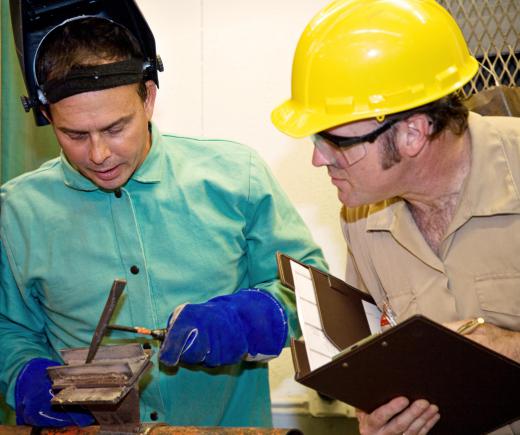At WiseGEEK, we're committed to delivering accurate, trustworthy information. Our expert-authored content is rigorously fact-checked and sourced from credible authorities. Discover how we uphold the highest standards in providing you with reliable knowledge.
What Does a Quality Inspector Do?
A quality inspector typically works in the manufacturing industry to ensure that the standards set forth by top engineers continue throughout the production process. Also known as quality-control inspectors or product testers, these professionals are counted on by management to spot defects in a company's products before consumers have the chance to. Though various quality-control certification agencies exist to provide more generalized training, many companies tailor their quality-assurance programs to suit their particular mission and product line.
According to the U.S. Bureau of Labor Statistics, nearly 70 percent of quality inspectors in 2008 were employed in the manufacturing sector. In more advanced environments, such as aerospace and aviation parts manufacturing, these professionals earned an average wage of $22.10 an hour in that year. On the lower end, those working in other industries made an average of $13.87 an hour. In 2008, about 450,000 Americans were employed as quality inspectors or product testers.

A quality inspector will use statistical methods to test products before they are presented to customers. This is necessary since for many products, every piece cannot be tested to assure quality. Testers or inspectors in food-processing or beer-making operations, for instance, cannot try every item before they are packaged. They can, however, perform statistical sampling to test items randomly at predetermined intervals of time or quantity. The result is a sense of security that the un-inspected products are flawless as well.

For some manufacturers, such as automobile or furniture makers, every function of every item may be tested by a quality inspector before that product leaves the factory. That could entail test-driving a vehicle and using all of its features. It could also mean lying on a mattress and even bouncing to ensure the springs will not squeak.
Every company is likely to have a slightly different set of responsibilities for a quality inspector. Some are required to accurately log defects in an effort to identify common problems and help engineers design solutions. They must be committed to becoming experts on a company's product line in order to spot anomalies and make adjustments accordingly.

Quality inspectors often are tenured members of a company's workforce, recognized by management to be the eyes and ears of the company during the production process. Other quality inspectors are required to have specialized training, such as advanced degrees in systems engineering, chemistry, statistics or technology management. The job requirements usually depend on the complexity of the product line and the methods used for ensuring quality.
AS FEATURED ON:
AS FEATURED ON:















Discussion Comments
Quality inspectors are a important part of a company. They will check the quality of goods before shipping or selling.
Post your comments